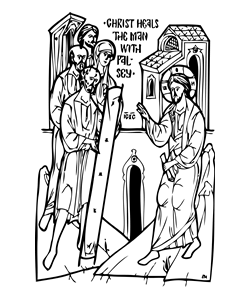|
|||
|---|---|---|---|
| This weekly bulletin insert complements the curriculum published by the Department of Christian Education of the Orthodox Church in America. This and many other Christian Education resources are available at http://dce.oca.org. | |||

Mark 2:1-12 is the story of the paralytic brought to Christ by his friends. Jesus has returned to Capernaum "after some days." Just before this He had healed a leprous man, who ignored His command to say nothing to anyone. The man spread the news, so that Jesus "could no longer enter a town, but was out in the country." Do we notice, in this passage, how completely Jesus Christ put Himself at the disposal of people? An exuberant chatterbox is able to keep the Lord from carrying out His plan, which had been to "go on to the neighboring towns, so that I may proclaim the message there also, for that is what I came out to do" (1:38). When Jesus does come to Capernaum, people so crowd the house where He is preaching that there is absolutely no room to get in the door. But this doesn't stop four men who are determined to bring their friend, a paralytic, to the Lord. Since they can't enter by the door, they go up on the flat roof and break an opening in it, then let their friend's pallet down into the house. The next verse tells us what Jesus notices: "When Jesus saw their faith, He said to the paralytic, 'Son, your sins are forgiven.'" The friends' faith is what is noteworthy for the Lord; it can bring about a miracle. What would we notice if we were in the crowded house when a man on a pallet suddenly poked down through the roof? Would we, too, be impressed by the faith of the man's friends, and by their care for him? Would we admire their ingenuity in finding a novel way to get him close to the Lord? Would we rejoice at Jesus' generous, healing love? Or would we be more like the scribes sitting there, who apparently notice none of these things? They only notice that Jesus is claiming the power to forgive sins. They question in their hearts, considering this a blasphemous claim of a power that belongs only to God. Jesus immediately challenges their unspoken questions, with the perception that sees so deeply and often make His opponents so uncomfortable. He proclaims that "the Son of man has authority on earth to forgive sins." Then He tells the paralytic to take up his pallet and go home. The man does so, to the amazement of all the people. Jesus doesn't explain what He means by calling Himself "Son of Man." Is He identifying with the human creatures He has come to save? Is He referring to the Old Testament messianic prophecy in Daniel 7:13-14? Commentators have said that He might be doing either, or both. Jesus wanted us to notice His words, and think about their meaning. To notice, to pay attention to what He does for us—this is what can bring us closer to Christ, and to a life filled with His love. |
|||
